タバコの先輩 Tabako no Senpai – Manga Breakdown
Original
Manga
Japanese
Today we’re breaking down タバコの先輩 (Tabako no Senpai), an original manga by アソビ. If you enjoy this one, you’ll find plenty more of アソビ’s awesome creations on Pixiv. With its easy to follow Japanese and fun storytelling, Tabako no Senpai is a fantastic pick for learners. Ready? Let’s get started!
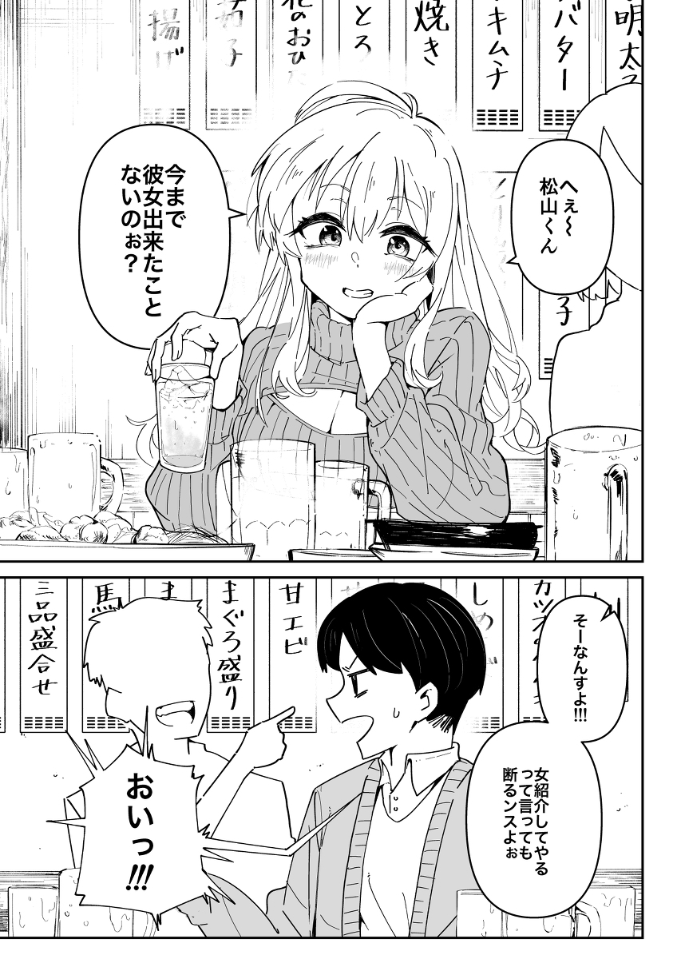
へえ~、松山くん今まで彼女できたことないの? Romaji: Ē-kun, Matsuyama-kun ima made kanojo dekita koto nai no? English: Eh~ Kun, Matsuyama-kun, have you never had a girlfriend before?
- へえ~ (ē) – Expression of surprise or disbelief, like “Eh~” or “Really?”
- 松山くん (Matsuyama-kun) – Matsuyama + kun (referring to the boy)
- 今まで (ima made) – Until now / so far
- 彼女 (kanojo) – Girlfriend / she / her (contextually: girlfriend)
- できた (dekita) – Was able to do / formed / got (in this case, “got a girlfriend”)
- こと (koto) – Thing / event / experience (used to nominalize the verb)
- ない (nai) – Not / doesn’t exist / haven’t
- の (no) – Sentence-ending particle that adds a questioning or explanatory tone
できたんすけど!この子に言うと断られそうでおあずけっす! Romaji: Dekita n su kedo! Kono ko ni iu to kotowarare-sō de oazuke ssu! English: I have had one! But if I tell this girl, she might reject me, so I’m holding back!
- できた (dekita) – Had / was able to do / formed (in this context, “had a girlfriend”)
- ん (n) – Casual contraction of “の”, used to explain or emphasize
- すけど (sukedo) – Casual/slurred form of “ですけど” (desu kedo) – But / although
- この子 (kono ko) – This girl / this child (affectionate or casual way to refer to someone)
- に (ni) – Particle indicating direction or target of an action (e.g., “to” someone)
- 言う (iu) – To say / to tell
- と (to) – If / when (used to indicate conditional clause)
- 断られそう (kotowarare-sō) – Might be rejected
- 断られ (kotowarare) – Passive form of “断る” (kotowaru) – to refuse / to reject
- そう (sō) – Seems like / looks like (used to express likelihood)
- で (de) – Because of / due to (indicates reason or cause)
- おあずけ (oazuke) – Put on hold / postponed / deferred
- っす (ssu) – Casual/slurred form of “です” (desu) – Copula (used to end a sentence politely or casually)
おいっ!! Romaji: Oi!! English: Hey!!
- おいっ (oi) – Hey! / Oi! (used to get someone’s attention, often with frustration or urgency)
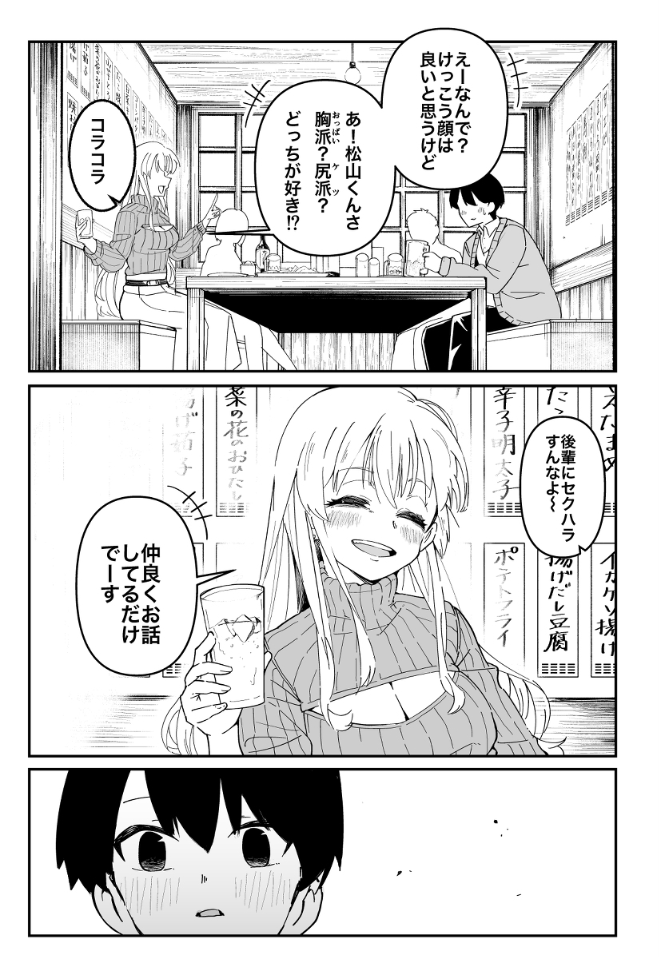
えーなんで? けっこう顔は良いと思うけど。
Romaji: Ē, nande? Kekkō kao wa ii to omou kedo.
English: Eh, why? I think your face is actually pretty good though.
- えー (ē) – Eh / What? (expression of surprise or disbelief)
- なんで (nande) – Why
- けっこう (kekkō) – Quite / fairly / unexpectedly good
- 顔 (kao) – Face
- は (wa) – Topic particle (marks "face" as the topic)
- 良い (ii) – Good / nice
- と (to) – Quotation particle (marks what is being thought or said)
- 思う (omou) – To think / to believe
- けど (kedo) – But / though (adds contrast or softens the statement)
あ!松山くんさ 胸派?尻派?どっちが好き!
Romaji: A! Matsuyama-kun sa, mune-ha? shiri-ha? docchi ga suki!
English: Ah! Matsuyama-kun, are you into chests or butts? Which do you like?
- あ! (a!) – Ah! / Oh! (interjection)
- 松山くん (Matsuyama-kun) – Matsuyama + kun (casual honorific for boys)
- さ (sa) – Casual emphasis particle (adds familiarity or playfulness)
- 胸派 (mune-ha) – Chest preference
- 胸 (mune) – Chest / breasts
- 派 (ha) – Faction / side / preference
- 尻派 (shiri-ha) – Butt preference
- 尻 (shiri) – Butt / rear
- 派 (ha) – Faction / side / preference
- どっち (docchi) – Which one / which side
- が (ga) – Subject particle (marks the thing being liked)
- 好き (suki) – Like / prefer
コラコラ
Romaji: Kora kora
English: Hey hey! (scolding tone)
- コラ (kora) – Hey! / Stop that! (used to scold or warn)
- コラ (kora) – Repeated for emphasis or urgency
後輩にセクハラすんなよ〜
Romaji: Kōhai ni sekuhara sunna yo~
English: Don’t sexually harass your junior~
- 後輩 (kōhai) – Junior / underclassman / younger colleague
- に (ni) – Particle indicating target or direction (to someone)
- セクハラ (sekuhara) – Sexual harassment (loanword from English)
- すんな (sunna) – Don’t do (casual negative command form of “suru”)
- よ〜 (yo~) – Sentence-ending particle for emphasis or warning
仲良くお話してるだけでーす
Romaji: Nakayoku ohanashi shiteru dake dēsu
English: We’re just having a friendly chat~
- 仲良く (nakayoku) – Friendly / getting along well
- お話 (ohanashi) – Talk / conversation
- 話 (hanashi) – Talk / story
- お (o) – Honorific prefix
- してる (shiteru) – Doing / having (casual form of “shite iru”)
- だけ (dake) – Only / just
- でーす (dēsu) – Polite sentence ender (elongated for cuteness or playfulness)
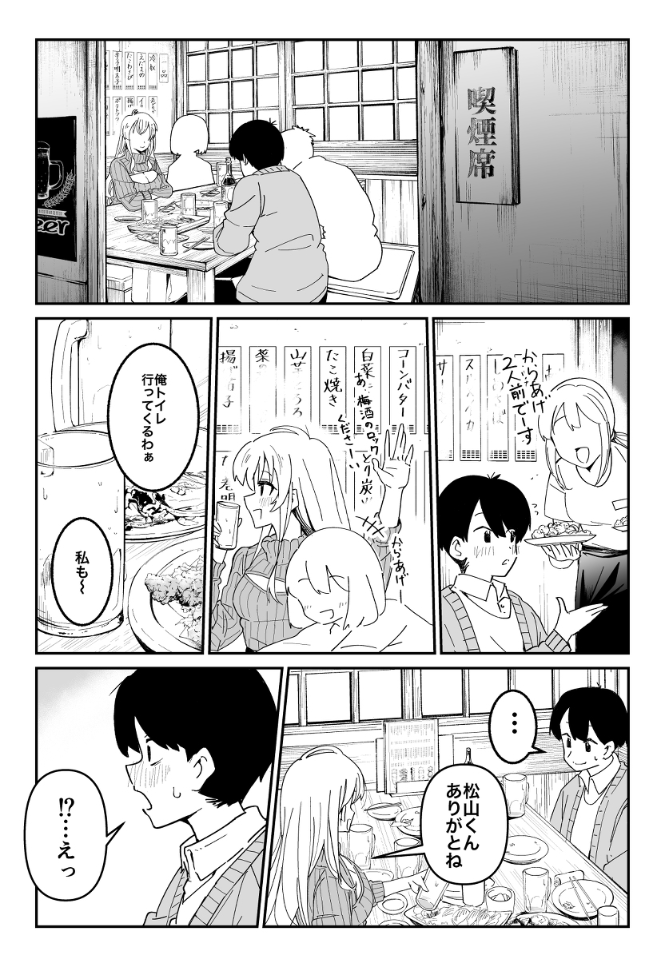
からあげ2人前です
Romaji: Karaage futari-mae desu
English: Two servings of fried chicken, please.
- からあげ (karaage) – Japanese-style fried chicken
- 2人前 (futari-mae) – Two servings
- 2 – Two
- 人前 (nin-mae) – Serving(s) for people
- です (desu) – Polite sentence ender / “is” / “please” (in ordering context)
俺トイレ行ってくるわぁ
Romaji: Ore toire itte kuru wā
English: I’m going to the bathroom.
- 俺 (ore) – I / me (casual, masculine)
- トイレ (toire) – Toilet / bathroom
- 行ってくる (itte kuru) – I’ll go and come back
- 行って (itte) – Go (te-form of “iku”)
- くる (kuru) – Come / return
- わぁ (wā) – Casual sentence-ending particle (adds softness or laid-back tone)
私も〜
Romaji: Watashi mo~
English: Me too~
- 私 (watashi) – I / me (neutral or feminine)
- も (mo) – Also / too
- 〜 – Elongated tone (adds cuteness or casualness)
松山くんありがとね
Romaji: Matsuyama-kun arigato ne
English: Thanks, Matsuyama-kun.
- 松山くん (Matsuyama-kun) – Matsuyama + kun (casual honorific for boys)
- ありがと (arigato) – Thanks (casual form of “arigatou”)
- ね (ne) – Sentence-ending particle (adds friendliness or confirmation)
えっ
Romaji: E
English: Huh? / What?
- えっ (e) – Expression of surprise, confusion, or disbelief
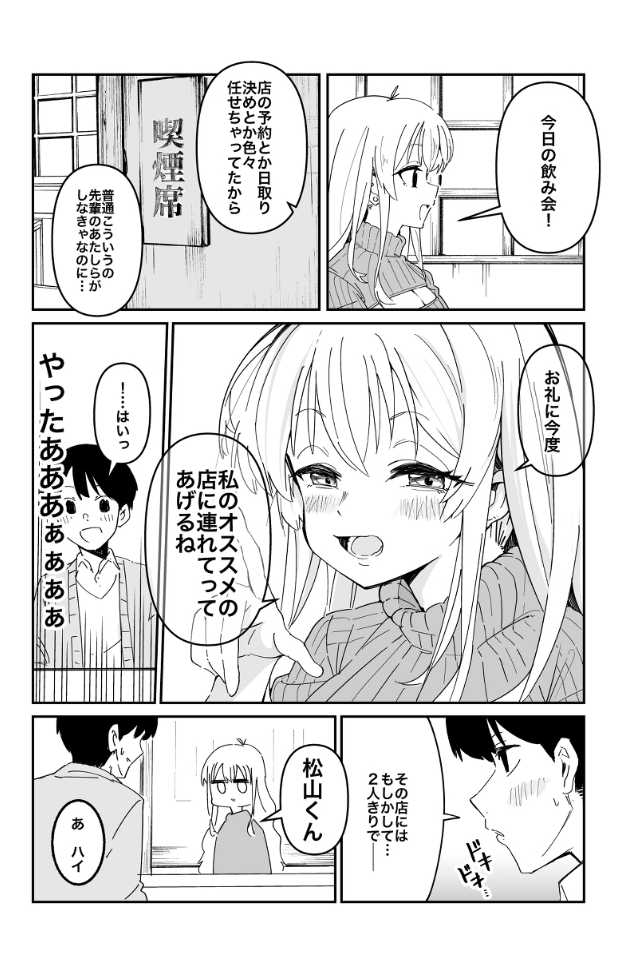
今日の飲み会
Romaji: Kyō no nomikai
English: Tonight’s drinking party
- 今日 (kyō) – Today
- の (no) – Possessive particle (“of”)
- 飲み会 (nomikai) – Drinking party / social gathering with drinks
店の予約とか日取り決めとか色々任せちゃってたから
Romaji: Mise no yoyaku toka hidori kime toka iroiro makasechatte-ta kara
English: Because I left all the stuff like booking the place and setting the date to you…
- 店 (mise) – Shop / restaurant
- の (no) – Possessive particle (“of”)
- 予約 (yoyaku) – Reservation / booking
- とか (toka) – Things like / and so on
- 日取り (hidori) – Date / schedule
- 決め (kime) – Decision / choosing (noun form of “kimeru”)
- とか (toka) – Again, “things like”
- 色々 (iroiro) – Various things / a lot
- 任せちゃってた (makasechatte-ta) – Had left it to / entrusted
- 任せ (makase) – Entrust / leave to
- ちゃってた (chatte-ta) – Casual past form indicating completion
- から (kara) – Because / since
先輩のあたしらが普通こういうのしなきゃなのに・・・
Romaji: Senpai no atashi-ra ga futsū kō iu no shinakya na no ni…
English: Even though we seniors should normally be the ones doing this…
- 先輩 (senpai) – Senior / upperclassman
- の (no) – Possessive particle
- あたしら (atashi-ra) – We (casual feminine “I” + plural)
- が (ga) – Subject particle
- 普通 (futsū) – Normally / usually
- こういうの (kō iu no) – Things like this
- しなきゃ (shinakya) – Must do (casual contraction of “shinakereba”)
- なのに (na no ni) – Even though / despite
お礼に今度
Romaji: Orei ni kondo
English: As thanks, next time…
- お礼 (orei) – Thanks / gratitude
- に (ni) – For / as
- 今度 (kondo) – Next time
私のオススメの店に連れてってあげるね
Romaji: Watashi no osusume no mise ni tsuretette ageru ne
English: I’ll take you to my favorite place!
- 私 (watashi) – I / me
- の (no) – Possessive particle
- オススメ (osusume) – Recommendation / favorite
- の (no) – Possessive particle
- 店 (mise) – Shop / restaurant
- に (ni) – To / toward
- 連れてって (tsuretette) – Take someone along (casual contraction of “tsurete iku”)
- あげる (ageru) – To do something for someone / give
- ね (ne) – Sentence-ending particle (adds friendliness)
はいっ
Romaji: Hai
English: Yes!
- はいっ (hai) – Yes! (with emphasis or enthusiasm)
その店にはもしかして・・・2人きりで
Romaji: Sono mise ni wa moshikashite… futari-kiri de
English: At that place… could it be… just the two of us?
- その (sono) – That
- 店 (mise) – Shop / restaurant
- には (ni wa) – At / in (combination of location and topic particles)
- もしかして (moshikashite) – Could it be / maybe
- 2人きり (futari-kiri) – Just the two of us
- で (de) – By / with (indicates means or context)
松山くん
Romaji: Matsuyama-kun
English: Matsuyama-kun
- 松山くん (Matsuyama-kun) – Matsuyama + kun (casual honorific for boys)
あ ハイ
Romaji: A, hai
English: Ah, yes.
- あ (a) – Ah / Oh
- ハイ (hai) – Yes
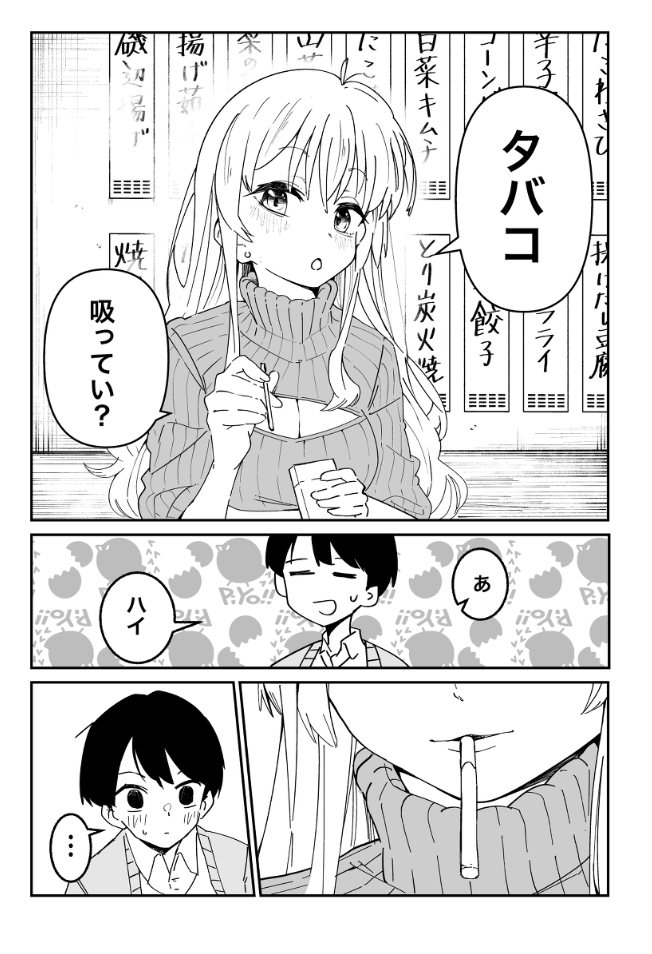
タバコ
Romaji: Tabako
English: Cigarette / tobacco
- タバコ (tabako) – Cigarette / tobacco (loanword from Portuguese “tabaco”)
吸ってい?
Romaji: Suttei?
English: Are you smoking?
- 吸って (sutte) – Smoking / inhaling (te-form of “suu” meaning “to smoke” or “to inhale”)
- い? (i?) – Casual contraction of “いる?” (iru?) – Are you? (used to ask about ongoing action)
Note: This is a very casual and abbreviated way of asking “Are you smoking?”—common in manga dialogue.
あ
Romaji: A
English: Ah / Oh
- あ (a) – Ah / Oh (interjection of realization or reaction)
ハイ
Romaji: Hai
English: Yes
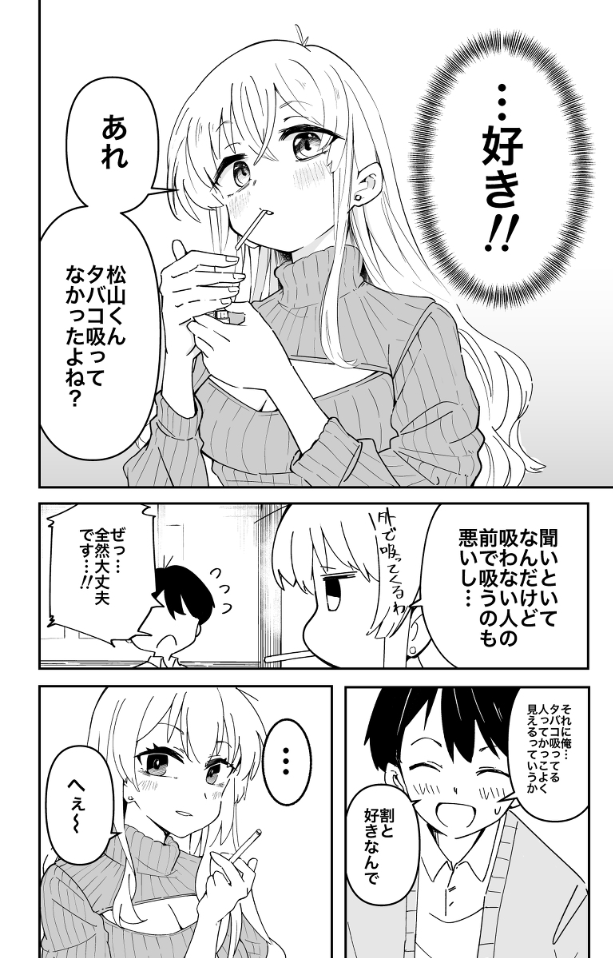
好き
Romaji: Suki
English: Like / love
- 好き (suki) – Like / fond of / love (depending on context)
あれ、松山くんタバコ吸ってなかったよね?
Romaji: Are, Matsuyama-kun tabako sutte nakatta yo ne?
English: Huh? Matsuyama-kun, you didn’t smoke, right?
- あれ (are) – Huh? / Wait a second (expression of surprise)
- 松山くん (Matsuyama-kun) – Matsuyama + kun (casual honorific for boys)
- タバコ (tabako) – Cigarette / tobacco
- 吸って (sutte) – Smoking / inhaling (te-form of 吸う)
- なかった (nakatta) – used with verbs to mean "did not": did not smoke
- よ (yo) – Emphasis particle
- ね (ne) – Confirmation-seeking particle
聞いといてなんだけど吸わない人の前で吸うのも悪いし
Romaji: Kiitōite nan da kedo suwanai hito no mae de suu no mo warui shi
English: I mean, I asked, but it feels wrong to smoke in front of someone who doesn’t.
- 聞いといて (kiitōite) – 聞く(kaku) - to ask / to hear → 聞いて te form. Then it’s combined with + おく (to do something in advance), forming: 聞いておく → "to ask ahead of time" / "to ask and leave it be". In casual speech, 聞いておいて gets contracted to: 聞いといて
- なんだけど (nan da kedo) – Though / even so
- 吸わない (suwanai) – Doesn’t smoke (negative form of “suu”)
- 人 (hito) – Person
- の (no) – Possessive particle
- 前 (mae) – In front of
- で (de) – At / in (location particle)
- 吸う (suu) – To smoke / inhale
- の (no) – Nominalizer (turns verb into noun)
- も (mo) – Also / even
- 悪い (warui) – Bad / wrong
- し (shi) – Because / and (used to list reasons)
ぜっ・・・全然大丈夫です
Romaji: Ze… zenzen daijōbu desu
English: N-no… it’s totally fine.
- 全然 (zenzen) – Totally / completely (often used with negatives, but here with affirmation)
- 大丈夫 (daijōbu) – Okay / fine / no problem
- です (desu) – Polite sentence ender
それに俺タバコすってる人ってかっこよく見えるっていうか
Romaji: Sore ni ore tabako sutteru hito tte kakkoyoku mieru tte iu ka
English: Also, I mean… people who smoke kind of look cool to me.
- それに (sore ni) – Also / moreover
- 俺 (ore) – I / me (casual masculine)
- タバコ (tabako) – Cigarette / tobacco
- すってる/吸ってる (sutteru) – Are smoking (casual form of “sutte iru”)
- 人 (hito) – Person / people
- って (tte) – used to define or describe something: as for the people who smoke
- かっこよく (kakkoyoku) – Cool / stylish (adverbial form of “kakkoii”)
- 見える (mieru) – Look / appear
- っていうか (tte iu ka) – I mean / sort of / like
割と好きなんで
Romaji: Warito suki nan de
English: I kind of like it, so…
- 割と (warito) – Rather / kind of / relatively
- 好き (suki) – Like / fond of
- なんで (nan de) – Because / so
へぇ
Romaji: Hē
English: Ohhh / Really?
- へぇ (hē) – Oh / Wow / Really?
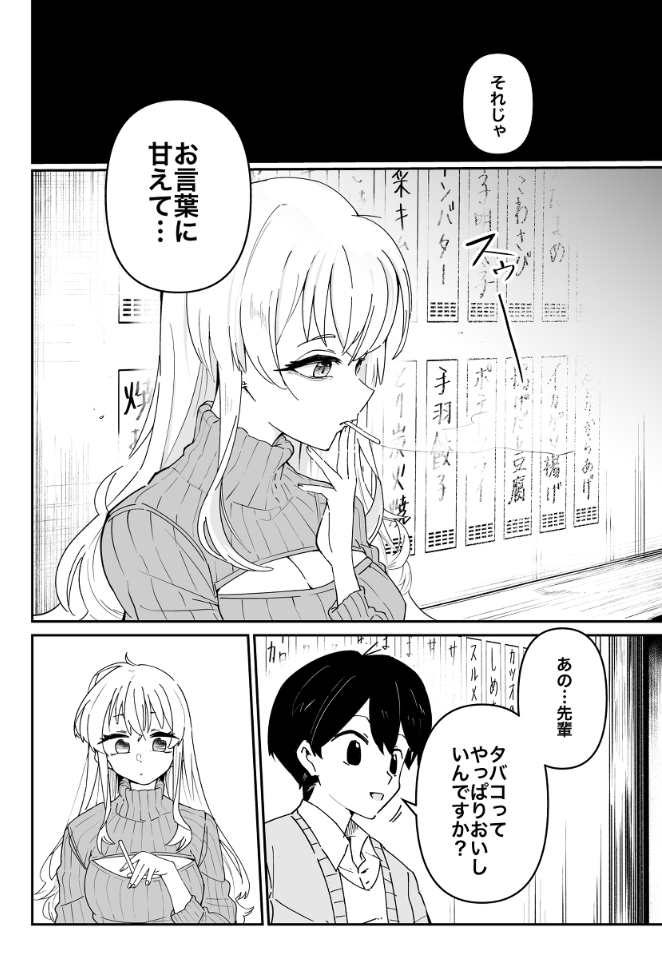
それじゃ
Romaji: Sore ja
English: Well then / In that case
- それ (sore) – That / it
- じゃ (ja) – Then / well
お言葉に甘えて…
Romaji: Okotoba ni amaete…
English: I’ll take you up on your kind offer…
- お言葉 (okotoba) – Your words
- に (ni) – Particle indicating marks the target of the action, which is okotoba
- 甘えて (amaete) – To take advantage of / to rely on (te-form of “amaeru”)
あの…先輩
Romaji: Ano… senpai
English: Um… Senpai
- あの… (ano…) – Hey… / Excuse me… (used to get attention or express hesitation)
- 先輩 (senpai) – Senior
タバコってやっぱりおいしいんですか?
Romaji: Tabako tte yappari oishii n desu ka?
English: Are cigarettes really tasty?
- タバコ (tabako) – Cigarette / tobacco
- って (tte) – Topic particle (casual form of “wa” or quotation marker)
- やっぱり (yappari) – As expected / really / after all
- おいしい (oishii) – Delicious / tasty
- ん (n) – Explanatory particle (casual contraction of “no”)
- です (desu) – Polite sentence ender
- か (ka) – Question particle
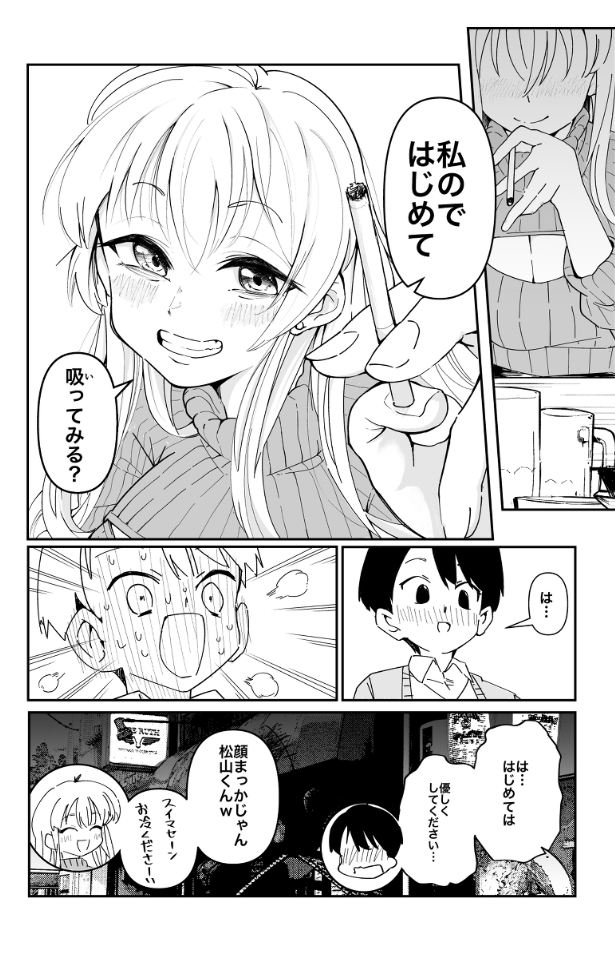
私ので はじめて
Romaji: Watashi no de hajimete
English: Your first time… with mine.
- 私 (watashi) – I / me
- の (no) – Possessive particle (“my”)
- で (de) – By / with / using - it indicates what is being used to do something: using hers to smoke for the first time
- はじめて (hajimete) – First time
吸ってみる?
Romaji: Sutte miru?
English: Wanna try smoking?
- 吸って (sutte) – Smoke / inhale (te-form of “suu”)
- みる (miru) – Try doing (auxiliary verb meaning “to try”)
- ? – Question marker (casual)
は...
Romaji: Ha…
English: Huh…
- は... (ha…) – Stammered or hesitant “yes” / “uh…”
は… はじめては. 優しくしてください・・・
Romaji: Ha… hajimete wa. Yasashiku shite kudasai…
English: M-my first time… please be gentle…
- は… (ha…) – Hesitation / stammer
- はじめて (hajimete) – First time
- は (wa) – Topic particle
- 優しく (yasashiku) – Gently / kindly (adverbial form of “yasashii”)
- して (shite) – Do / treat (te-form of “suru”)
- ください (kudasai) – Please (polite request)
- ・・・ – Ellipsis (trailing off, emotional tone)
顔まっかじゃん 松山くんw スイマセーン お冷ください
Romaji: Kao makka jan, Matsuyama-kun w. Suimasēn, ohiya kudasai
English: Your face is totally red, Matsuyama-kun lol. Excuse me, cold water please!
- 顔 (kao) – Face
- まっか (makka) – Bright red / flushed
- じゃん (jan) – Isn’t it? / Totally is (casual emphasis)
- 松山くん (Matsuyama-kun) – Matsuyama + kun (casual honorific)
- w – Internet slang for “lol” (from “warau” meaning “to laugh”)
- スイマセーン (suimasēn) – Excuse me! (casual/slurred form of “sumimasen”)
- お冷 (ohiya) – Cold water (polite restaurant term)
- ください (kudasai) – Please (polite request)
Did you manage to understand it easily? If yes, good job! If not, do not give up. It takes time and practice to read manga in japanese, so keep it up. If you enjoyed this content or it helped you, stay tuned for more. This website has some mini-games in the games section, so be sure to practice there. If you'd like to support my work of bringing these breakdowns, please consider buying a plan. It not only supports my website, but it also provides more perks on the website to help you learn japanese faster. Check it here. Take care!